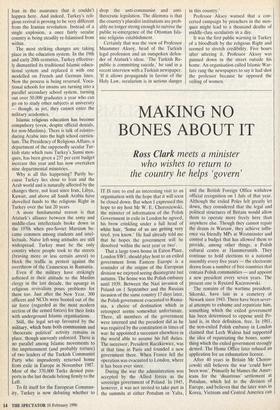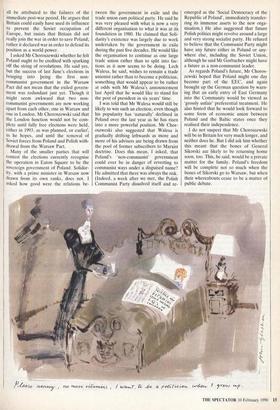MAKING NO BONES ABOUT IT
Ross Clark meets a minister
who wishes to return to the country he helps 'govern'
IT IS rare to end an interesting visit to an organisation with the hope that it will soon be closed down. But when I expressed this hope to my host Mr W. E. Choroszewski, the minister of information of the Polish Government in exile in London he agreed, his brow crinkling under a full head of white hair, 'Some of us are getting very tired, you know.' He had already told me that he hopes the government will be dissolved 'within the next year or two'.
That a large town house in Eaton Place, London SW1, should play host to an exiled government from Eastern Europe is a reminder of the origins of the European division we enjoyed seeing disintegrate last autumn. The house was the Polish embassy until 1939. Between the Nazi invasion of Poland on 1 September and the Russian invasion of the same country 17 days later, the Polish government evacuated to Ruma- nia, a choice of destination which in retrospect seems somewhat unfortunate. There, all members of the government were interned and the president did as he was required by the constitution in times of war: he appointed a successor elsewhere in the world able to assume his full duties. The successor, President Raczkiewicz, was at that time in Paris and founded a new government there. When France fell the operation was evacuated to London, where it has been ever since.
During the war the administration was accepted by the Allied forces as the sovereign government of Poland. In 1945, however, it was not invited to take part in the summits at either Potsdam or Yalta, and the British Foreign Office withdrew official recognition on 1 July of that year. Although the exiled Poles felt greatly let down, they considered that the legal and political structures of Britain would allow them to operate more freely here than anywhere else. Though they cannot repair the drains in Warsaw, they achieve influ- ence via friendly MPs at Westminster and control a budget that has allowed them to provide, among other things, a Polish cultural centre at Hammersmith. They continue to hold elections to a national assembly every five years — the electorate drawn from a number of free countries that contain Polish communities — and appoint a new president every seven years. The present one is Ryszard Kaczorowski.
The remains of the wartime president, Sikorski, have lain in a cemetery at Newark since 1943. There have been sever- al attempts to exhume and repatriate him, something which the exiled government has been determined to oppose until Po- land is, in their definition, free. In 1981, the non-exiled Polish embassy in London claimed that Lech Walesa had supported the idea of repatriating the bones, some- thing which the exiled government strongly denied. The Home Office later refused an application for an exhumation licence.
After 40 years in Britain Mr Choros- zewski still believes the war 'could have been won'. Primarily he blames the Amer- icans for the 'disastrous' settlement at. Potsdam, which led to the division of Europe, and believes that the later wars in Korea, Vietnam and Central America can
all be attributed to the failures of the immediate post-war period. He argues that Britain could easily have used its influence to prevent the Soviet occupation of Europe, but insists that Britain did not really join the war in order to save Poland; rather it declared war in order to defend its position as a world power.
I asked Mr Choroszewski whether he felt Poland ought to be credited with sparking off the string of revolutions. He said yes, but the success of last June's elections in bringing into being the first non- communist government in the Warsaw Pact did not mean that the exiled govern- ment was redundant just yet. Though it might seem awkward that two non- communist governments are now working apart from each other, one in Warsaw and one in London, Mr Choroszewski said that the London function would not he com- plete until fully free elections were held, either in 1993, as was planned, or earlier, as he hopes, and until the removal of Soviet forces from Poland and Polish with- drawal from the Warsaw Pact.
Many of the smaller parties that will Contest the elections currently recognise the operation in Eaton Square to be the sovereign government of Poland. Solidar- ity, with a prime minister in Warsaw now drawn from its own ranks, does not. I asked how good were the relations be-
tween the government in exile and the trade union cum political party. He said he was very pleased with what is now a very different organisation to what it was at its foundation in 1980. He claimed that Soli- darity's existence was largely due to work undertaken by the government in exile during the past five decades. He would like the organisation to continue as one large trade union rather than to split into fac- tions as it now seems to be doing. Lech Walesa, he said, wishes to remain a trade unionist rather than to become a politician, something that would appear to be rather at odds with Mr Walesa's announcement last April that he would like to stand for the post of president in six years' time.
I was told that Mr Walesa would still be likely to win such an election, even though his popularity has 'naturally' declined in Poland over the last year as he has risen into a more powerful position. Mr Chor- oszweski also suggested that Walesa is gradually drifting leftwards as more and more of his advisers are being drawn from the pool of former subscribers to Marxist doctrine. Does this mean, I asked, that Poland's 'non-communist' government could ever be in danger of reverting to communist ways under a disguised name? He admitted that there was always the risk. (Indeed, a week after we met, the Polish Communist Party dissolved itself and re-
emerged as the 'Social Democracy of the Republic of Poland', immediately transfer- ring its immense assets to the new orga- nisation.) He also suggested that future Polish politics might revolve around a large and very strong socialist party. He refused to believe that the Communist Party might have any future either in Poland or any- where else, including the Soviet Union, although he said Mr Gorbachev might have a future as a non-communist leader.
As regards Poland's future, Mr Choros- zewski hoped that Poland might one day become part of the EEC, and again brought up the German question by warn- ing that an early entry of East Germany into the Community would be viewed as 'grossly unfair' preferential treatment. He also hinted that he would look forward to some form of economic union between Poland and the Baltic states once they realised their independence.
I do not suspect that Mr Choroszewski will be in Britain for very much longer, and neither does he. But I did ask him whether this meant that the bones of General Sikorski ate likely to be returning home soon, too. This, he said, would be a private matter for the family. Poland's freedom will be complete not so much when the bones of Sikorski go to Warsaw, but when their whereabouts cease to be a matter of public debate.



















































 Previous page
Previous page